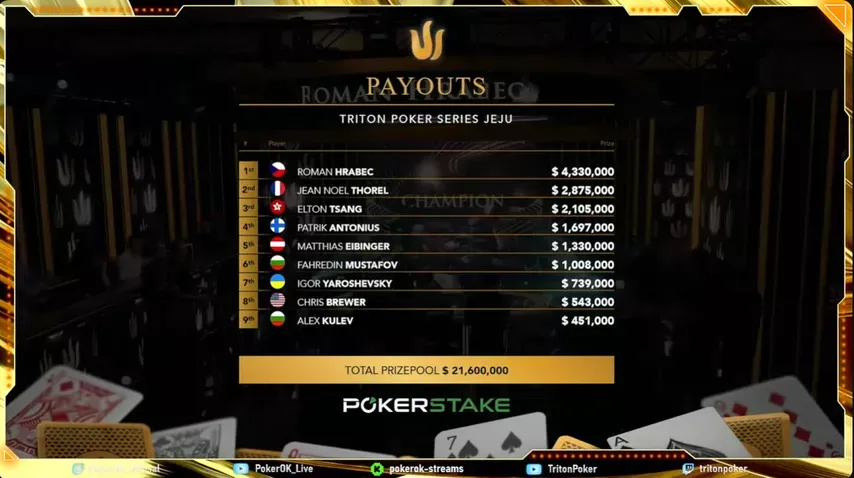Timofey Kuznetsov spent the final day of the main tournament in the company of Dmitry Shakhov and Ilya Gorodetsky. For almost 7 hours, Trueteller talked with the presenters, answered questions from the chat, and recalled stories from his youth.
Dmitry Shakhov: In the chat, they ask what you are doing now. Why didn't you go to the series?
Timofey Kuznetsov: For the last year and a half, I have hardly played poker; I am more involved in investing and trading. I don't go offline either; before the series, I ask what the cache will be and figure out how many times they'll let me play. On this Triton, I would have been able to sit at the table 1.5 times, so I decided not to fly. It is still inconvenient to get to Korea from Moscow – with transfers. In Montenegro, most likely, they will let me play, so there is a better chance that I will fly. For example, at the series in Sochi, which took place several years ago, I didn't get into the expensive cash game at all. It depends on who's playing. One VIP at the table is enough to veto you specifically. In this regard, regulars have fewer rights, but this is quite normal.
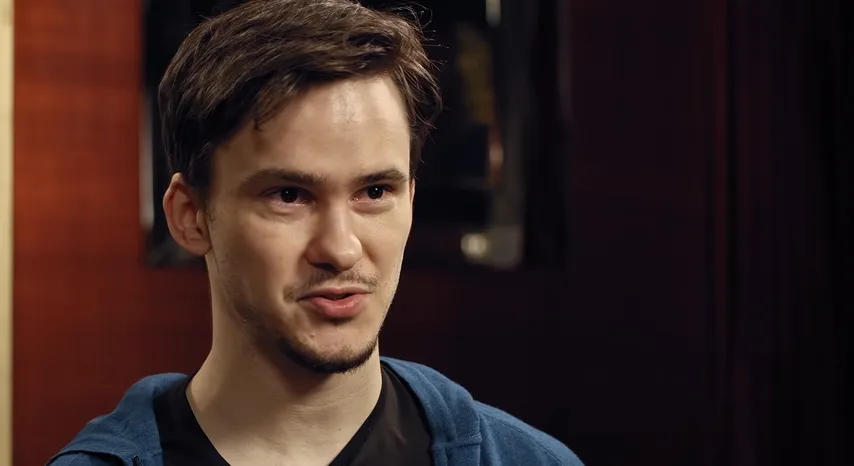
There was a funny situation on one of the first Tritons. There I had more opportunities to get into the cash games, but Paul and Richard set a condition that all cash players must play tournaments. We wanted to gather more people. Me, Rui Kao, and Phil Ivey ended up at the same table, and in order to get back into the cash faster, we just blindly flipped when we were on the button, SB, and BB. We had Q6, K2, and T5.
DS: They ask about trolling Michael Addamo. You offered to play heads-up with him because you needed a new Ferrari.
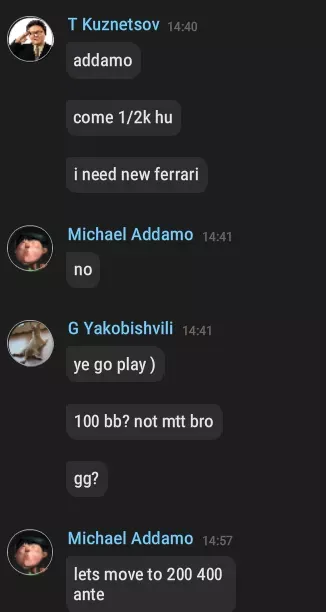
TK: He promised me a heads-up a long time ago, on one of the old Tritons. I already reminded him of this in the chat, and he replied that he was ready to play, but in the end, he left. Therefore, I will continue to dig into it. He plays cash games quite well, and MTT too, but his strategy works there. For some reason, everyone folds against him. I played cash with him during his famous upstreak, when he sat down at expensive tables. It was always a pleasure to play with him, you just play solitaire and he pays twice as much as he should.
In the top 10, Timofey impressed Ilya Gorodetsky, who joined the commentators. Stephen Chidwick opened with SB, Roman Grabec defended BB.
TK: Chidwick will likely bet 375,000 on the flop.
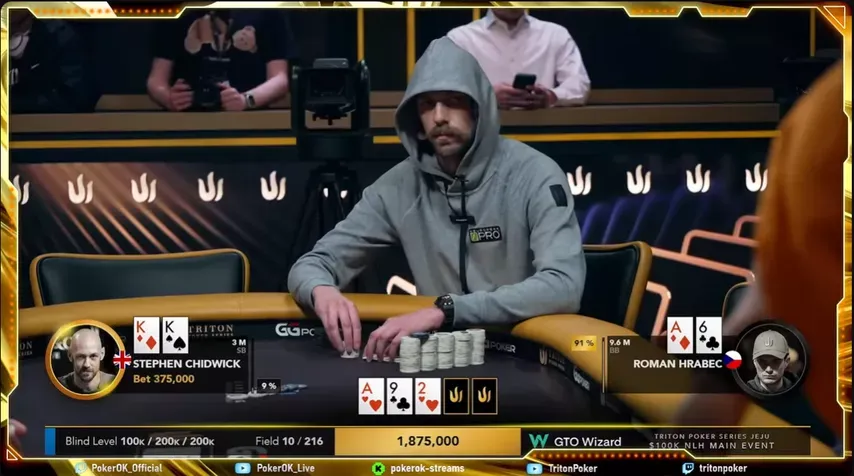
IG: Did you just guess or do you know how much to bet on the solver?
TK: I know how much Chidwick bets in such situations. Some players round up their bets, others choose uneven amounts. Chidwick bets round on the turn and bets like this on the flop. He checks this turn.
Timofey was right again. Roman also checked.
TK: Too neat a check. is better to bet with, because with all the stronger aces, Chidwick himself will bet on the turn, and with to – check-call.
IG: Can thin reads like that be used in the game? Or, is Chidwick balanced, and the fact that you know exactly his sizings does not help much?
TK: Can be used if he chooses a different size on the flop, for example, 450,000. He doesn't know that I know that he always bets 375,000 here.
On the river, Chidwick made a small bet.
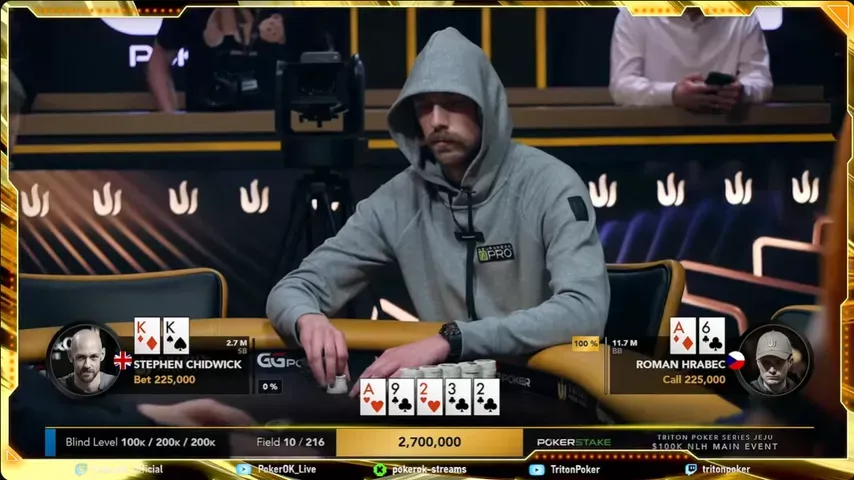
TK: I don't like betting the river. Check-calling with Kings looks better.
Roman simply called.
TK: But this is a blunder, he should raise. If Chidwick knows that will not raise the river, then his bet immediately becomes great.
Roman Grabec spent the final day with some kind of orange. In the chat, they suggested that this is a special variety of Korean tangerines – hallabong (editor – it actually looks like a noji tangerine).
During important moments, Roman put it in front of his cards, and this helped him quite well. Trueteller immediately noted the importance of this element.
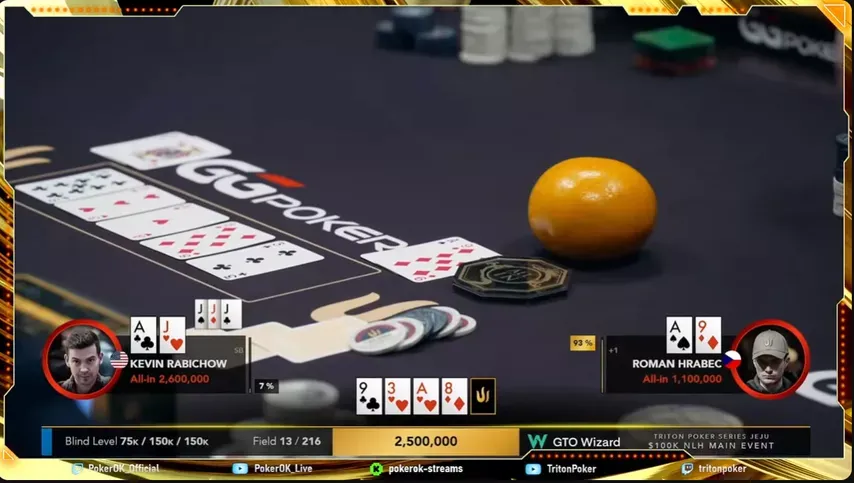
True, this tangerine technique failed once. In the top 10, Grabec doubled Matthias Eibinger.
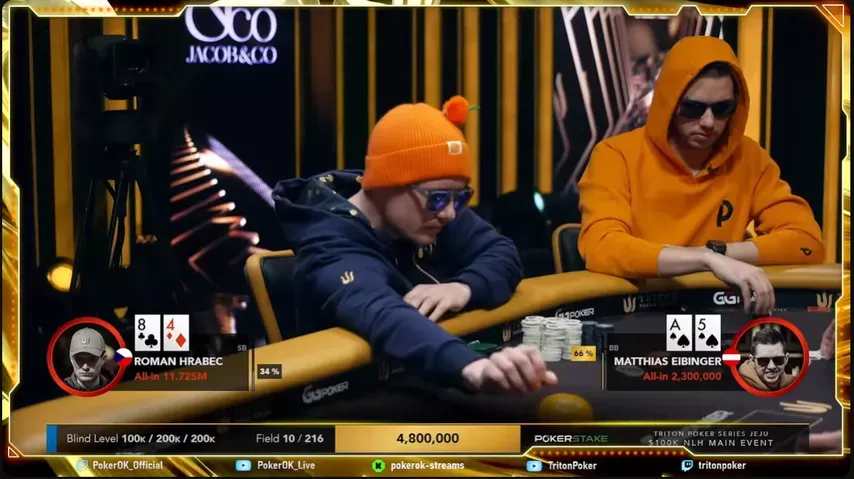
TK: He placed it somewhat uncertainly this time, as if he himself didn't believe in victory. With , it was completely different, there he put it forward quickly and sat quietly.
A few hands later, Roman was up against Stephen Chidwick.
DS: Let's see how the orange works this time. Has he placed it confidently enough now?
TK: Averagely. There will be a flush draw, but it will not get there.
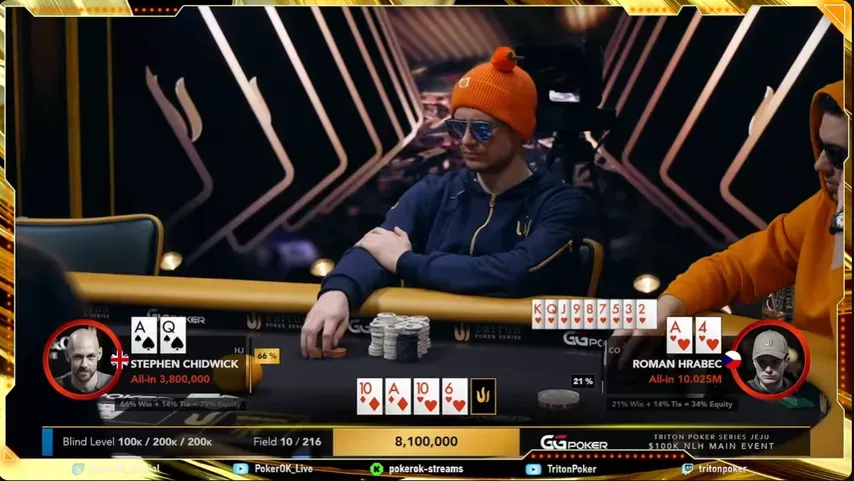
On the turn, Roman was actually given a flush draw and Chidwick was the final table bubble boy ($378,000).
During the break before the finalists were seated, Timofey answered several questions from the chat.
– Have you spent 10,000 hours playing poker in your entire career?
– Even more than 20,000. I've been playing for 14 years, the first 6-7 I spent 2,500 hours playing poker every year. Between 2010 and 2012, I only skipped play poker for three days. Without such obsession, it is impossible to quickly climb the limits.
– Do you do backing?
– Not in large numbers. I introduce friends to high stakes, mostly cash, rarely tournaments.
– What are your plans for this year?
– Perhaps I'll go to some Triton. As for investments, I plan that the Russian stock market will rise and the ruble will fall.
– Your most expensive misclick?
– When I played very high limits for 20 hours a day, there were definitely misclicks worth hundreds of thousands, but I don't remember specific examples. I make a lot of these mistakes due to inattention and loss of concentration. I think Mikita Badziakouski makes such mistakes 5 times less.
– What is your greatest strength?
– Controlled aggression and understanding how my opponents see my image at the table.
– You are one of the few examples when a Holdem specialist moves into mixed games and becomes one of the best there too. Other strong NL regulars, for example, Mikita, would also be able to achieve success in mixes if you wanted to?
– I have this approach: if you are a good professional player, then it is not you who chooses the type and place of the game, but the game itself chooses you.
If there's an expensive Omaha game in Vegas right now, I'll play it. If I'm not very good at Omaha, I'll do everything I can to improve my level as quickly as possible. I've always had this approach. And mixed games are also just more interesting for me to play. I think almost any strong NLHE reg would be successful in mixes. No-Limit Holdem has always been the most competitive game.
True, there is also a predisposition to certain games. For example, Omaha is more suitable for me than Holdem. If a person is psychologically more inclined to defend, then it is better for him to play games with static equity – Razz, Badugi or Hold'em. Aggressive players find it easier in games with dynamic equity – Omaha or Short Deck. In general, I would advise everyone to try different options. Unfortunately, this road is now closed to beginners. There are no mixed games online at all, and offline, only if you only travel around America.
(Editor's note – Timofey is right about mixed games; they are hard to find online. PokerStars is one of the only spots to play the kinds of mixed games he's talking about. There isn't much action on most of the formats (except Short Deck), but you can privately host the table yourself with Home Games. If you know a few players, start up a 6-handed game of Razz, HORSE, 8-Game – whatever you feel like.
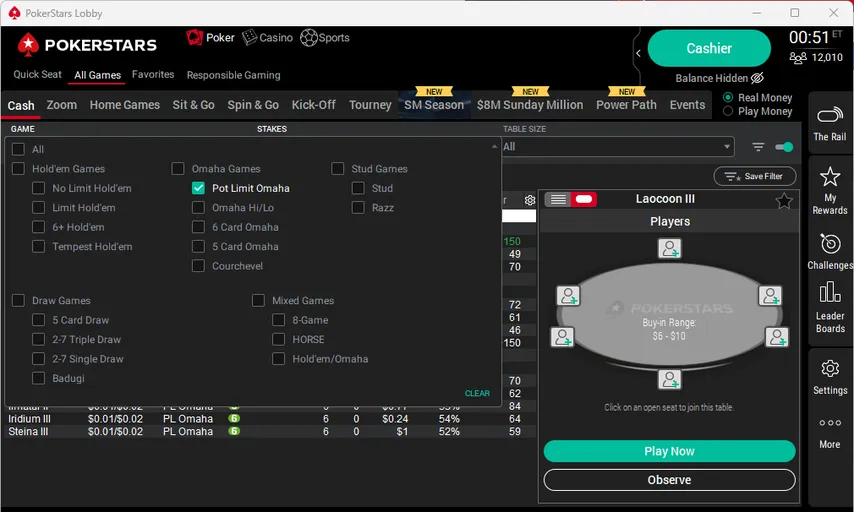
As for the Triton finalists, Dmitry Shakhov included Elton Tsang among the semi-professionals.
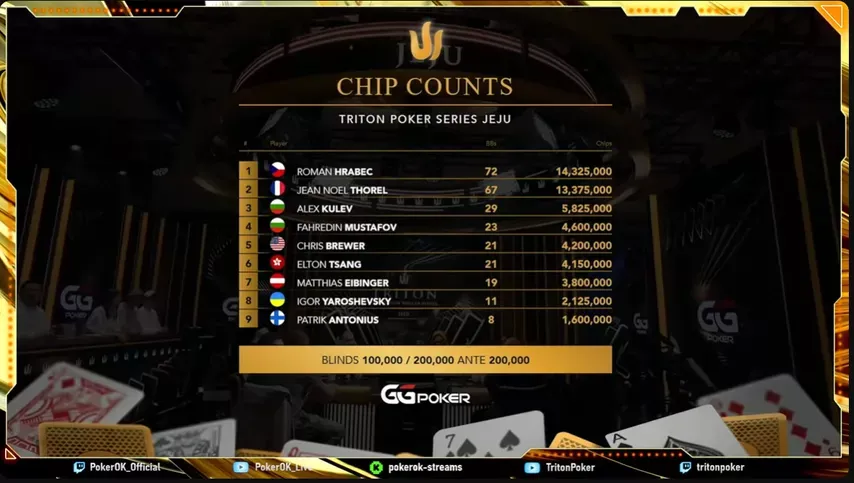
"I wouldn't say that," Trueteller objected. – Elton was originally a poker pro and now, I think, he also considers himself a professional. He is from Canada, but in 2008 he got into good games in Macau and Hong Kong. He rose in the Asian offline scene and won a lot there. He has an atypical history for modern professionals. His yearly winnings in poker are probably comparable to all the other finalists combined. It is clear that tournaments are not his main specialization, and he doesn't always win. During the series, he comes to play cash games and plays in tournaments for fun.
There is a funny story about him. For winning the One Drop million-dollar tournament in Monaco, he was given a watch worth $300k. One of the Chinese high rollers offered him $1.5 million for it, but Elton refused.
9th place went to Alex Kulev ($451,000), who started the final table with the third stack.
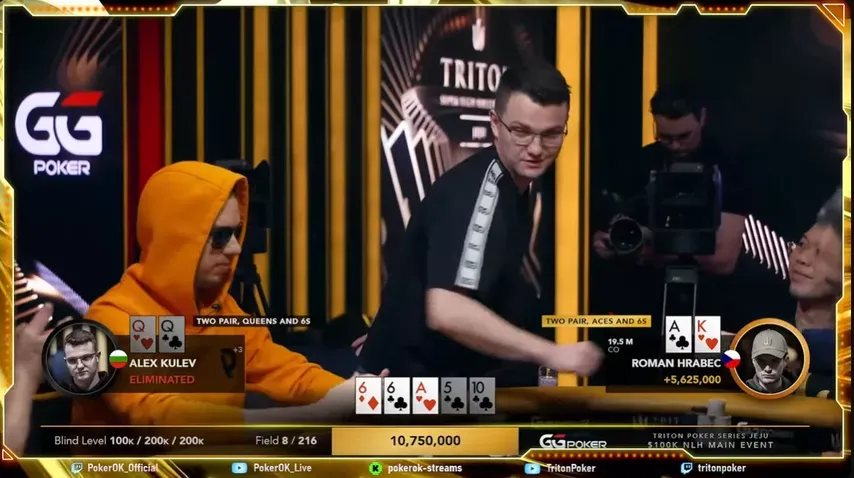
8th was Chris Brewer ($543,000), who played the entire tournament wearing a mask.
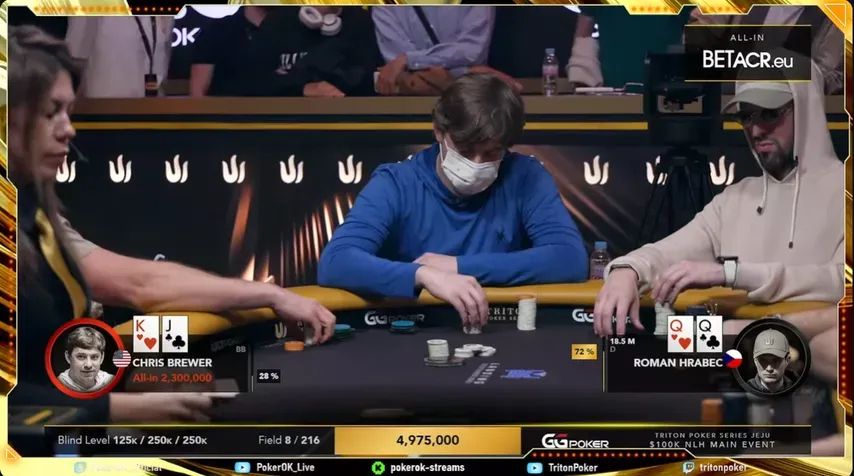
IG: Is Chris Brewer doing an Ike Haxton impersonation?
TK: Rather, Ike is his backer and forces him to play with a mask.
IG: Is this serious or a joke?
TK: Seriously about backing, not sure about the mask. Among American regs, Ike is the largest backer. If any US player is playing on Triton, chances are he has a stake.
DS: Avr0ra said that Ike is on the commission of regs, which determines the odds of players in high-stakes tournaments. This does not happen at the time of sale, but after the end of the tournament, when the rankings and number of entries can be assessed.
TK: In such a system it should be possible to set odds of 0.95-0.97, because there will be terrible tables. In general, the rise of commercialized backing is a big disadvantage of modern MTTs. A lot of people play for 10-20 points from themselves, the rest are sold for 1.05. In such conditions it's not so fun for VIPs to play. Regs take almost no risks and are very interested in the victory of their friends.
- GipsyTeam's unique promotions
- Help with deposits and cashouts
- Access to private freerolls
- Round-the-clock support
- GipsyTeam's unique promotions
- Help with deposits and cashouts
- Access to private freerolls
- Round-the-clock support
- GipsyTeam's unique promotions
- Help with deposits and cashouts
- Access to private freerolls
- Round-the-clock support
- Уникальные акции от GipsyTeam
- Помощь с депозитами и кешаутами
- Доступ в закрытые фрироллы
- Круглосуточная поддержка
- Уникальные акции от GipsyTeam
- Помощь с депозитами и кешаутами
- Доступ в закрытые фрироллы
- Круглосуточная поддержка
- GipsyTeam's unique promotions
- Help with deposits and cashouts
- Access to private freerolls
- Round-the-clock support
- Уникальные акции от GipsyTeam
- Помощь с депозитами и кешаутами
- Доступ в закрытые фрироллы
- Круглосуточная поддержка
- GipsyTeam's unique promotions
- Help with deposits and cashouts
- Access to private freerolls
- Round-the-clock support
- GipsyTeam's unique promotions
- Help with deposits and cashouts
- Access to private freerolls
- Round-the-clock support
- GipsyTeam's unique promotions
- Help with deposits and cashouts
- Access to private freerolls
- Round-the-clock support
- GipsyTeam's unique promotions
- Help with deposits and cashouts
- Access to private freerolls
- Round-the-clock support
- GipsyTeam's unique promotions
- Help with deposits and cashouts
- Access to private freerolls
- Round-the-clock support
- GipsyTeam's unique promotions
- Help with deposits and cashouts
- Access to private freerolls
- Round-the-clock support
- GipsyTeam's unique promotions
- Help with deposits and cashouts
- Access to private freerolls
- Round-the-clock support
- GipsyTeam's unique promotions
- Help with deposits and cashouts
- Access to private freerolls
- Round-the-clock support
- GipsyTeam's unique promotions
- Help with deposits and cashouts
- Access to private freerolls
- Round-the-clock support
- GipsyTeam's unique promotions
- Help with deposits and cashouts
- Access to private freerolls
- Round-the-clock support
- GipsyTeam's unique promotions
- Help with deposits and cashouts
- Access to private freerolls
- Round-the-clock support
- GipsyTeam's unique promotions
- Help with deposits and cashouts
- Access to private freerolls
- Round-the-clock support
- GipsyTeam's unique promotions
- Help with deposits and cashouts
- Access to private freerolls
- Round-the-clock support
- GipsyTeam's unique promotions
- Help with deposits and cashouts
- Access to private freerolls
- Round-the-clock support
- GipsyTeam's unique promotions
- Help with deposits and cashouts
- Access to private freerolls
- Round-the-clock support
- Уникальные акции от GipsyTeam
- Помощь с депозитами и кешаутами
- Доступ в закрытые фрироллы
- Круглосуточная поддержка
- GipsyTeam's unique promotions
- Help with deposits and cashouts
- Access to private freerolls
- Round-the-clock support
- GipsyTeam's unique promotions
- Help with deposits and cashouts
- Access to private freerolls
- Round-the-clock support
- GipsyTeam's unique promotions
- Help with deposits and cashouts
- Access to private freerolls
- Round-the-clock support
- GipsyTeam's unique promotions
- Help with deposits and cashouts
- Access to private freerolls
- Round-the-clock support
- GipsyTeam's unique promotions
- Help with deposits and cashouts
- Access to private freerolls
- Round-the-clock support
- GipsyTeam's unique promotions
- Help with deposits and cashouts
- Access to private freerolls
- Round-the-clock support
- Уникальные акции от GipsyTeam
- Помощь с депозитами и кешаутами
- Доступ в закрытые фрироллы
- Круглосуточная поддержка
- GipsyTeam's unique promotions
- Help with deposits and cashouts
- Access to private freerolls
- Round-the-clock support
- GipsyTeam's unique promotions
- Help with deposits and cashouts
- Access to private freerolls
- Round-the-clock support
- Уникальные акции от GipsyTeam
- Помощь с депозитами и кешаутами
- Доступ в закрытые фрироллы
- Круглосуточная поддержка
- GipsyTeam's unique promotions
- Help with deposits and cashouts
- Access to private freerolls
- Round-the-clock support
- Уникальные акции от GipsyTeam
- Помощь с депозитами и кешаутами
- Доступ в закрытые фрироллы
- Круглосуточная поддержка
- Уникальные акции от GipsyTeam
- Помощь с депозитами и кешаутами
- Доступ в закрытые фрироллы
- Круглосуточная поддержка
- GipsyTeam's unique promotions
- Help with deposits and cashouts
- Access to private freerolls
- Round-the-clock support
- GipsyTeam's unique promotions
- Help with deposits and cashouts
- Access to private freerolls
- Round-the-clock support
- GipsyTeam's unique promotions
- Help with deposits and cashouts
- Access to private freerolls
- Round-the-clock support
- Уникальные акции от GipsyTeam
- Помощь с депозитами и кешаутами
- Доступ в закрытые фрироллы
- Круглосуточная поддержка
- GipsyTeam's unique promotions
- Help with deposits and cashouts
- Access to private freerolls
- Round-the-clock support
- GipsyTeam's unique promotions
- Help with deposits and cashouts
- Access to private freerolls
- Round-the-clock support
- GipsyTeam's unique promotions
- Help with deposits and cashouts
- Access to private freerolls
- Round-the-clock support
- GipsyTeam's unique promotions
- Help with deposits and cashouts
- Access to private freerolls
- Round-the-clock support
- Уникальные акции от GipsyTeam
- Помощь с депозитами и кешаутами
- Доступ в закрытые фрироллы
- Круглосуточная поддержка
- GipsyTeam's unique promotions
- Help with deposits and cashouts
- Access to private freerolls
- Round-the-clock support
- GipsyTeam's unique promotions
- Help with deposits and cashouts
- Access to private freerolls
- Round-the-clock support
At this stage, a certain calm reigned at the table, and the presenters had time to talk about abstract topics.
IG: Was there a point in online poker when you couldn't say who the undisputed strongest player was in, technical terms?
TK: At the beginning of the 2010s, Katya18 played the strongest, in 2015-17 OtB_RedBaron clearly stood out, then Linus was obviously the strongest, Viktor Blom also played well. Now it's hard to say, many people play Holdem technically well, and there is no clear leader.
IG: In chess, there are players who play "pure chess," and there are others who do not always choose the objectively strongest move, but also force their opponents to make mistakes more often. Is there something similar in poker?
TK: Yes, of course. In chess, this is supposedly called "taking complications." I'm definitely prone to doing things like that. This is roughly the same thing as what I said earlier about the predisposition to play with dynamic and static equity. Mikita, Katya18, Chidwick are vivid examples of supporters of "pure poker".
IG: Tom Dwan doesn't owe you anything?
TK: I won't answer this question. I don't think Tom will be offended if I say that he is one of the worst tournament players in history. In one of the millionaires, I placed a last longer bet on Paul Phua against Tom, and paid a 10% commission. Paul was very pleased with this bet. I knocked Tom out myself.
There was another funny episode with Dwan during the millionaire period in London. He asked me to help his friend Vivek Rajkumar prepare for the finals and give some tips on the game. This happened the day before, and it was impossible to prepare properly in such a time, so I just wrote one phrase – "don't bluff at Chidwick." He eventually gave the entire stack to him.
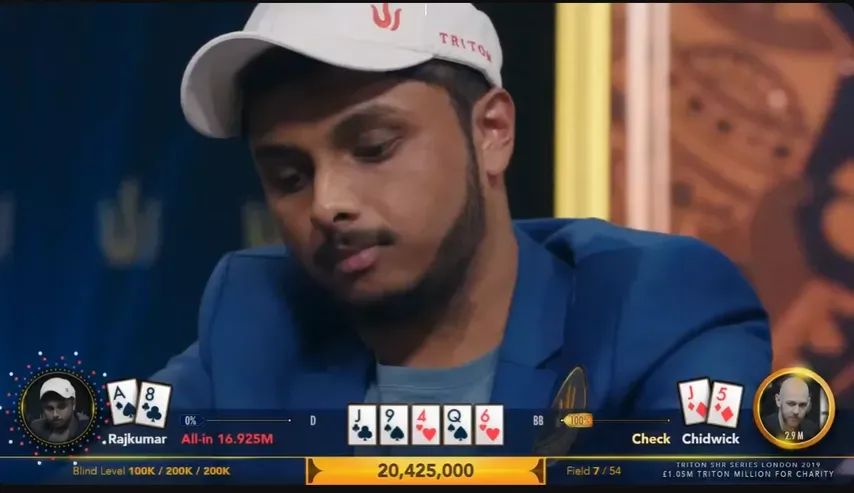
7th place went to Igor Yaroshevsky ($739,000). In terms of money, this result was the best in his career.
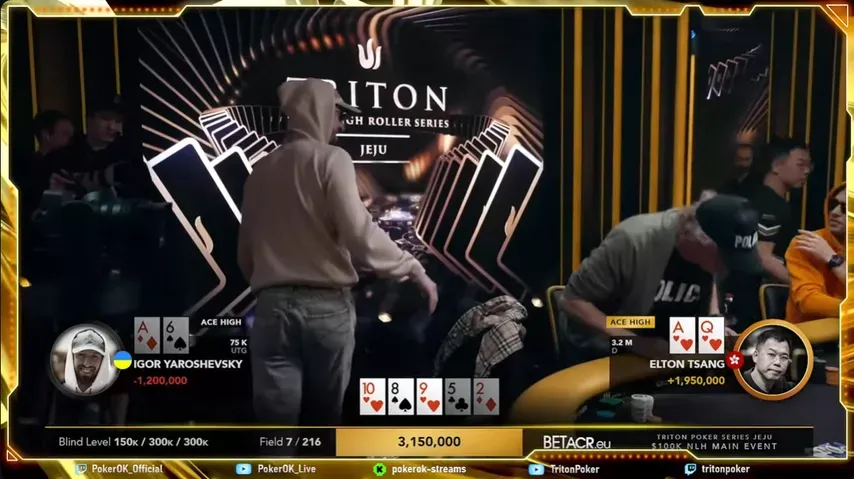
Igor lost to Elton Tsang and managed to say goodbye to everyone, but it turned out that he had 75,000 left (big blind 300,000). However, it was not possible to run it up.
IG: You have now temporarily switched to semi-amateur status. When you watch such broadcasts, do you have a desire to return?
TK: Not yet, but my desire to play greatly depends on the availability of high-stakes poker games online. Usually they are not there, that's why I don't play.
IG: Was a very high-stakes game on a crypto site interesting to you because of the anticipation or for other reasons?
TK: There was a good, high-stake game, but then the conditions for regulars deteriorated greatly, so now almost no one plays.
IG: Were there any problems with the calculations?
TK: Once again I'll have to refuse to comment. Sometimes situations arise in which the participants come to certain agreements, and everyone is relatively happy with them. But with public disclosure, for some players, it will look so-so. But since we have agreed, there is no point in disclosing it.
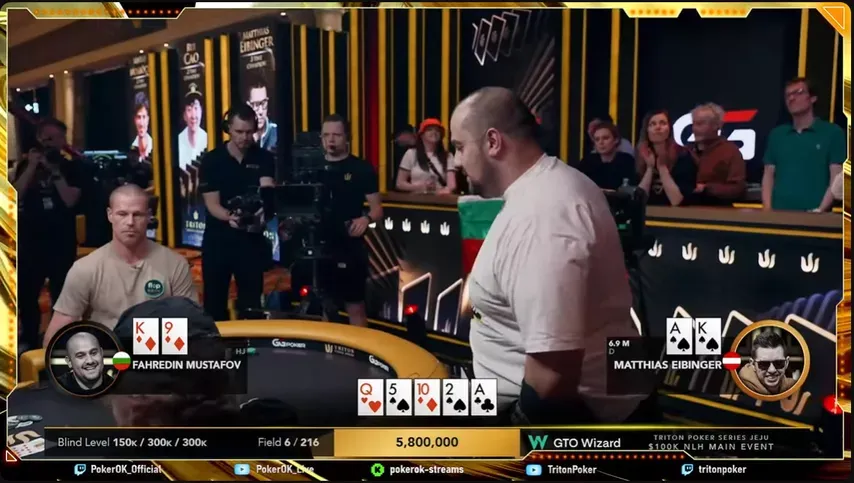
6th place went to Fahredin Mustafov from Bulgaria ($1,008,000).
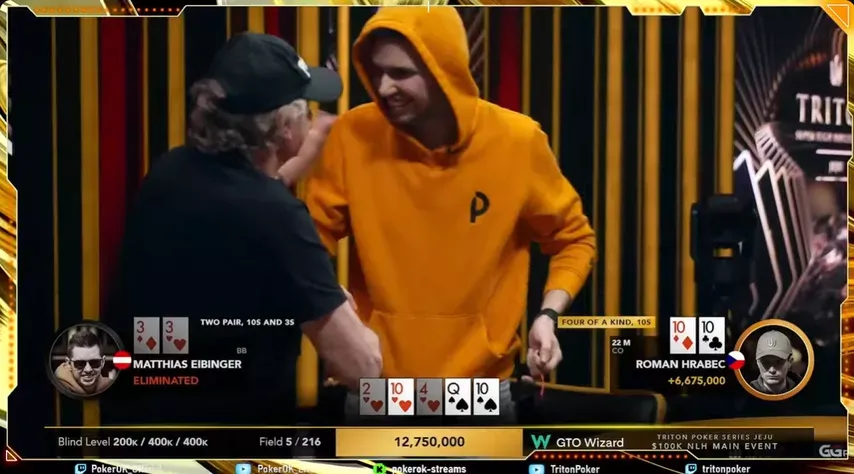
Matthias, who knocked him out, went out next ($1,330,000).
The next victim of the mighty orange man was Patrik Antonius, against whom Roman one-outered.
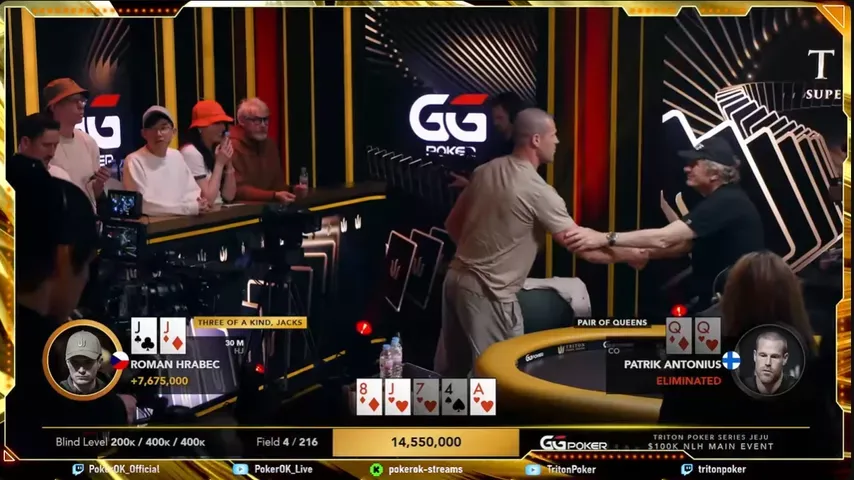
For 4th place, Antonius received $1,697,000.
Already in the next hand, Roman could have won heads-up, but he was seriously short against the second chip leader Thorel.
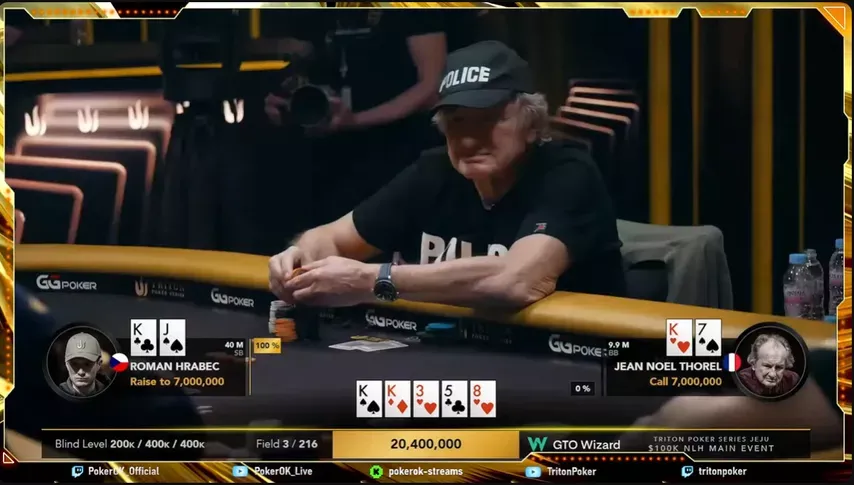
Roman opened from the small blind, the flop was check-checked, and on the turn, Roman chose the check-call line. On the river, he check-raised.
TK: Roman checked the flop in vain; Thorel will rarely bet in position on such a flop. He should have check-raised the turn and shoved the river. If Elton were in his place, he would have taken the entire stack. Check-calling on the turn is a terrible play; we'll often get check-check on the river.
Elton Tsang, who started the final table as one of the shortest, was knocked out one step away from heads-up.
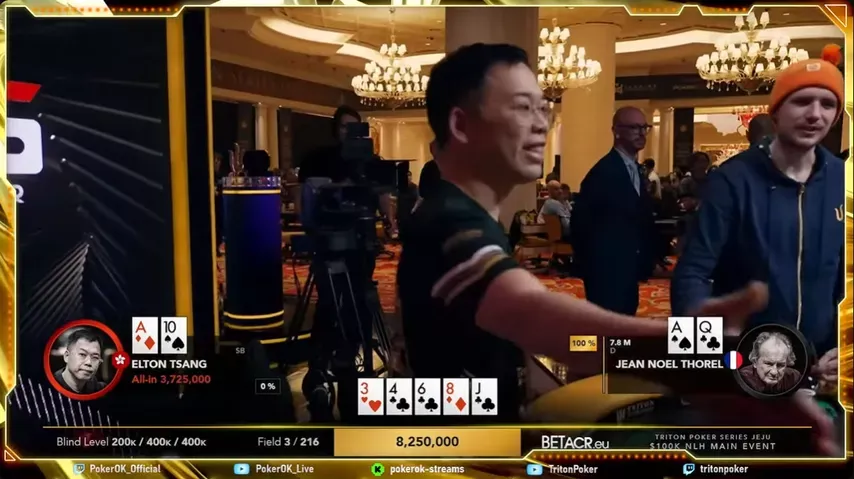
In this tournament he received $2,105,000. A couple of days before he won $4,210,000 in a $150k buy-in tournament.
The heads-up started with stacks of 39 million versus 15 million in favor of Roman.
DS: In the chat, they ask whether they will cut a deal? It's unlikely. Thorel is not interested, and Roman probably thinks he has the advantage.
TK: Cary Katz offered me to split one high-stakes tournament heads-up. I said that I would agree to give him the cup if I received money for first place. He politely refused. There are fans who really want to take the trophy. On one of the Tritons, an important VIP approached Phua and asked him to arrange a tournament so that he would have a realistic chance of winning. I offered to play heads-up, in which his stack and buy-in would be 10 to 1. He also refused, he wanted something more prestigious.
The tournament ended with a creative prank performed by Thorel.
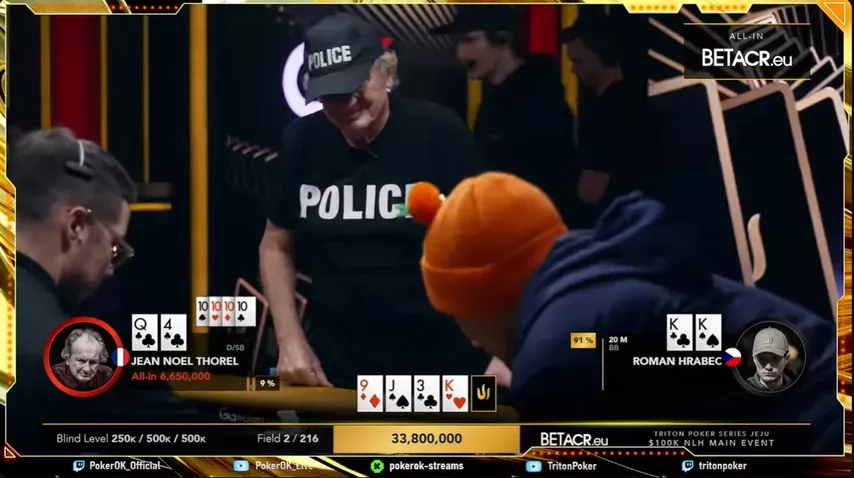
Jean-Noel opened 4x and called a 3-bet, called a quarter pot bet on the flop and shoved the turn. 4 outs were not covered.
